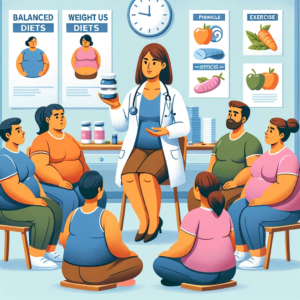
Weighing the Scale: Benefits and Risks of Anti-Obesity Medication
Explore the nuanced realm of anti-obesity medications with Registered Dietitian Alyssa Pittman. Dive into an

Carbohydrates are one of the primary macronutrients, alongside proteins and fats. They serve as the body’s main source of energy. The brain, in particular, relies heavily on glucose, a type of carbohydrate, to function.
Low-carb diets, such as the ketogenic diet and the Atkins diet, limit carbohydrate intake in favor of higher fat and protein intake. These diets can lead to short-term weight loss and have been used for certain medical conditions, like epilepsy. However, long-term effects are still being studied, and such diets might not be suitable for everyone.
Instead of focusing strictly on the quantity of carbs, it's crucial to consider the quality. Opting for whole, nutrient-dense sources of carbs and limiting refined sugars and processed foods is generally a balanced approach.
Individual carb needs can vary based on age, gender, activity level, metabolic health, and other factors. What works for one person might not work for another. I can offer personalized advice.
For most people, avoiding carbohydrates altogether isn’t recommended. Instead, it’s about choosing high-quality, nutrient-dense carbohydrate sources and balancing them with other essential macronutrients. If someone is considering a low-carb or carb-restrictive diet, it’s essential to consult with a healthcare professional or dietitian. They can provide guidance tailored to individual needs and circumstances.

Hello! I’m Alyssa Pittman, a 35-year-old Registered Dietitian based in Shrewsbury, MA. I still remember the day I passed the RD exam – it remains one of the best days of my life! All my hard work, dedication, and countless hours poured into studying and understanding the intricate world of nutrition had finally paid off. More than the personal achievement, I was ecstatic about channeling my passion for food and nutrition to aid others. Whether it’s assisting those grappling with weight issues, helping manage diseases through diet, or guiding those with disordered eating patterns, my commitment to making a positive difference has been my driving force.
My intrigue with nutrition took root during my junior year in high school. A vivid memory that stands out is when I eagerly educated my classmates about which granola bar was the healthiest option. 😊 Fast forward a bit, and as I delved deeper into my first nutrition class at Framingham State University, I was taken aback. I had stepped into a universe that was much broader and profound than just granola bars and apples. It dawned on me that nutrition was a profound science, influencing not just our physical wellbeing but also our mental health.
Beyond the professional realm, I treasure the time I spend with my beloved husband and our two spirited young boys in our Shrewsbury home. Our evenings often oscillate between cozy family movie nights and playful sports sessions in the backyard. It’s these moments of laughter and bonding that add true richness to my life.
Now, let me take you through my professional journey, where my passion for nutrition came to life in various impactful roles:
At Harvard Street, I faced the exhilarating challenge of creating a nutrition department from scratch. Collaborating with dedicated doctors and nurses, I provided specialized nutrition counseling for patients of all ages and backgrounds. In addition, I championed community nutrition, overseeing a food pantry to ensure both availability and education about nutritious food choices.
In this role, I was responsible for ensuring that seniors across 13 centers in Rhode Island had access to nutritious meals that met state and USDA guidelines. Beyond the menus, I organized weight loss groups, offered individual counseling, and took to the stage to educate seniors on topics close to their heart – quite literally – such as heart health, diabetes, and more.
Here, I worked with the vibrant college community, offering nutrition counseling on various topics like sports nutrition, food allergies, and eating disorders. One of my proud achievements was leading the Food Allergy and Special Diet Program, ensuring that students with dietary needs felt safe and catered for. I also took on the academic hat, presenting to classes about the foundational and specialized aspects of nutrition.
Throughout these roles, one thing has remained constant: my passion for helping individuals foster a healthier relationship with food. By understanding, respecting, and working with our unique dietary needs and preferences, I believe we can all lead healthier, happier lives.

Explore the nuanced realm of anti-obesity medications with Registered Dietitian Alyssa Pittman. Dive into an

Whether it’s children who turn up their noses at veggies or adults with a limited

it’s about choosing high-quality, nutrient-dense carbohydrate sources and balancing them with other essential macronutrients.

Detoxes and cleanses often promise to remove toxins from the body, boost energy, and aid

A holistic approach to reducing inflammation also involves maintaining a healthy weight, getting regular exercise,

I recognize their potential role in a balanced diet and their suitability for specific dietary

My view on intermittent fasting underscores the importance of individualization, nutrient intake, and overall dietary

I’ve seen the ups and downs, the fads, and the failures. But here’s what I’ve

In a world where everyone’s schedules are bustling, and distractions are many, accountability can be
